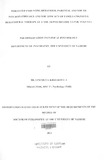| dc.contributor.author | Khasakhala, L | |
| dc.date.accessioned | 2013-05-23T15:58:51Z | |
| dc.date.available | 2013-05-23T15:58:51Z | |
| dc.date.issued | 2012 | |
| dc.identifier.uri | http://erepository.uonbi.ac.ke:8080/xmlui/handle/123456789/25036 | |
| dc.description.abstract | The association between psychiatric illness in parents and their ability to parent, as
well as the effect of the parenting behaviour on their children has both clinical and public mental
health policy relevance. Cognitive Behaviour Therapy (CBT) is an evidence-based psychological
• practice that reduces relapse rates and facilitates the recovery of persons who have mental illness
when combined with standard psychiatric treatment methods .
. Objectives: This clinical trial study was conducted to determine whether: (1) Maladaptive
parenting behaviour is associated with parental and youths' psychiatric disorders; (2) Combined
Family Cognitive Behaviour Therapy (F-CBT) with Standard Methods of Psychiatric Treatment
Methods (SPTM) have better outcome in treating Diagnostic and Statistical Manual 4th Edition
(DSM-IV) axis 1 psychiatric disorders found among family members than the SPTM alone.
Methodology: History, psychological examinations and structured psychiatric interviews were
carried out on a total sample of 678 participants; 250 youths, 226 mothers and 202 fathers to
determine psychiatric disorders at; baseline, follow upl and follow up 2. Maladaptive parenting
behaviours and mental state functioning were assessed using the Egna Minnen Betraffande
Uppfostran (Swedish acronym of My Memories of upbringing-EMBU) and Mini Mental State
Examination (MMSE) questionnaires respectively. Psychiatric disorders were assessed using the
Mini International Neuropsychiatric Interview for Youths and Adolescents (MINI -Kid)
administered to youth and Mini International Neuropsychiatric Interview for Adults (MINIPLUS)
administered to parents. Participants were divided into two' groups randomly: intervention
and control where intervention group received both F-CBT and SPTM and control received only
SPTM.
xxi
Results: Most of the youth in the study perceived their parents to have high levels of
maladaptive parenting behaviour, whether or not the parents had a psychiatric disorder: 55.1%,
of mothers were perceived to have rejecting, while 23.9% and 12.4% of them were perceived to
be under protective and no emotional connectedness parenting behaviour. Among fathers: 53.8%
were perceived to be under protective while 24.9%, and 7.6% were perceived to have rejecting
and no emotional connectedness parenting behaviour. Most of the mothers had depressive
disorders (51.3%).The presence of maternal depressive disorder was associated with increased
odds (2.14 times greater) to have Major Depressive disorder (MDD) and suicidal behaviour
among the youth. Fathers with alcohol use disorders had higher levels of maladaptive paternal
parenting behaviour than did fathers without alcohol use disorders. Youths who had seen their
father drunk/using alcohol excessively had high odds (2.82 times greater) of having alcohol
dependence than youths who had not seen their father drunk/use alcohol excessively. The
proportion of youths with alcohol use disorders that had peers using alcohol also (44.4%) was
higher than the proportion of youths with alcohol use disorders (8.3%) but did not have peers
using alcohol. An alcohol use disorder among fathers was also associated with increased
maternal odds (2.42 times greater) of having depressive disorder. The families allocated to the
experimental group had better outcome in terms of response to treatments as compared to the
control group.
Conclusion: These results provide significant vital insights into the effects of parenting
behaviour and parents' psychopathology on the development of psychopathology in their youths. | en |
| dc.description.sponsorship | The University of Nairobi | en |
| dc.language.iso | en | en |
| dc.subject | Perceived parenting behaviour | en |
| dc.subject | parental and youth Psychopathology and the efficacy of family-cognitive | en |
| dc.subject | Youth psychiatric clinic in Kenya | en |
| dc.title | Perceived parenting behaviour, parental and youth psychopathology and the efficacy of family-cognitive | en |
| dc.type | Thesis | en |
| local.publisher | Department of Psychology | en |

